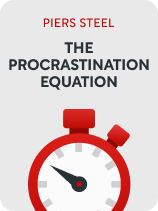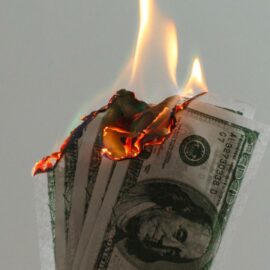

This article is an excerpt from the Shortform book guide to "The Procrastination Equation" by Piers Steel. Shortform has the world's best summaries and analyses of books you should be reading.
Like this article? Sign up for a free trial here.
What is immediate gratification? Why do we prefer short-term rewards over long-term gain?
Immediate gratification, also known as instant gratification, is one of the main reasons why people procrastinate. Procrastinators often seek out short-term rewards made by impulsive decisions, rather than fulfill long-term goals.
Continue reading to learn how immediate gratification plays a role in procrastination.
We Choose Instant Gratification Over Long-Term Gain
The Procrastination Equation by Piers Steel argues that choosing immediate gratification over long-term gain often plays a substantial role in procrastination. People who procrastinate for this reason choose rewards they can get right away over those they have to wait for, even if the payoff of waiting is much larger.
(Shortform note: Procrastination has been linked to following unhelpful impulses since classical times. The ancient Greeks had a word that encompasses both procrastination and lack of impulse control: akrasia. Akrasia loosely means doing things against your better judgment, whether choosing to follow a problematic impulse for an instant reward, choosing to avoid an important task, and so on. Some experts suggest that akrasia represents a conflict between our present and future selves: We have trouble acting in ways that benefit our future selves (but not necessarily our present selves).)
Therefore, rather than working toward long-term goals step-by-step, these procrastinators are more likely to put off tasks with future deadlines until the last minute. They procrastinate by making impulsive decisions that bring them immediate pleasure without fully considering the consequences of delaying their more important tasks. This creates urgency and stress once they finally reach deadlines and have to complete the tasks in drastically shortened time windows.
(Shortform note: According to Brian Tracy in Eat That Frog!, some people claim that the pressure of close deadlines leads to better work, suggesting that this kind of procrastination may be beneficial. However, Tracy cites research suggesting that the opposite is true: The pressure of an imminent deadline adds stress, which leads to mistakes that force you to redo work. This takes up more time, negatively affecting both the quality and efficiency of your work. To avoid this, Tracy advises adding 20% to the estimated time a project will take to leave room for unforeseen issues. When you feel calmer and more confident about your ability to finish in time, you’ll do better work.)
Steel says the tendency to act on impulses for immediate rewards stems from a general human propensity to view future tasks as abstract and immediate tasks as concrete. When we think of tasks and concerns in abstract terms, we’re less likely to act on them, making us more likely to act based on immediate instead of future concerns.
For example, say you’re an artist, and you want to submit your painting to an art show. The deadline to submit is a month away, which feels abstract, so you don’t fill out your application yet. Over the next few weeks, every time you think about filling it out, you tell yourself that you still have plenty of time. You choose to do something more concrete and immediately enjoyable instead, like reading a book or scrolling through social media. Then, one day, you realize there’s just a few hours until the deadline, and you have to scramble to get your application materials together. They aren’t as good as they could have been if you’d acted sooner, and you cause yourself a lot of unnecessary stress trying to get them in on time.
| What Would Your Future Self Say? In Someday Is Today, Matthew Dicks discusses how to align your actions with the interests of your future self—his advice may help you avoid viewing future tasks as abstract, thus reducing your procrastination. According to Dicks, we often make decisions based on our current thoughts and feelings (what Steel might describe as impulses), and these decisions are largely influenced by outside forces (like other people). Because of these outside influences, many decisions we make aren’t in our best interests and don’t reflect what we want. To make better everyday choices that more closely align with your goals and interests, only perform tasks that would matter to your future self. Every time you’re faced with a task, consider what your 100-year-old self would want. Would they want you to do it, or would they prefer you spent the time doing something else? Considering your future self as someone with wants and opinions makes the future more concrete, making it easier to act based on future concerns. For example, say you’ve been procrastinating setting up a retirement account. You always find other ways to spend the money you’d use to start the account, such as booking a trip or buying a new phone. Next time you have enough money to start the account, think about what your 100-year-old self would want—would they care about the trip and phone that are both long gone, or would they care more about the retirement savings that could provide them security and comfort? |

———End of Preview———
Like what you just read? Read the rest of the world's best book summary and analysis of Piers Steel's "The Procrastination Equation" at Shortform.
Here's what you'll find in our full The Procrastination Equation summary:
- Strategies to help procrastinators increase their motivation and control
- How to make unpleasant tasks feel more valuable for yourself
- Why procrastinators are typically less financially successful






